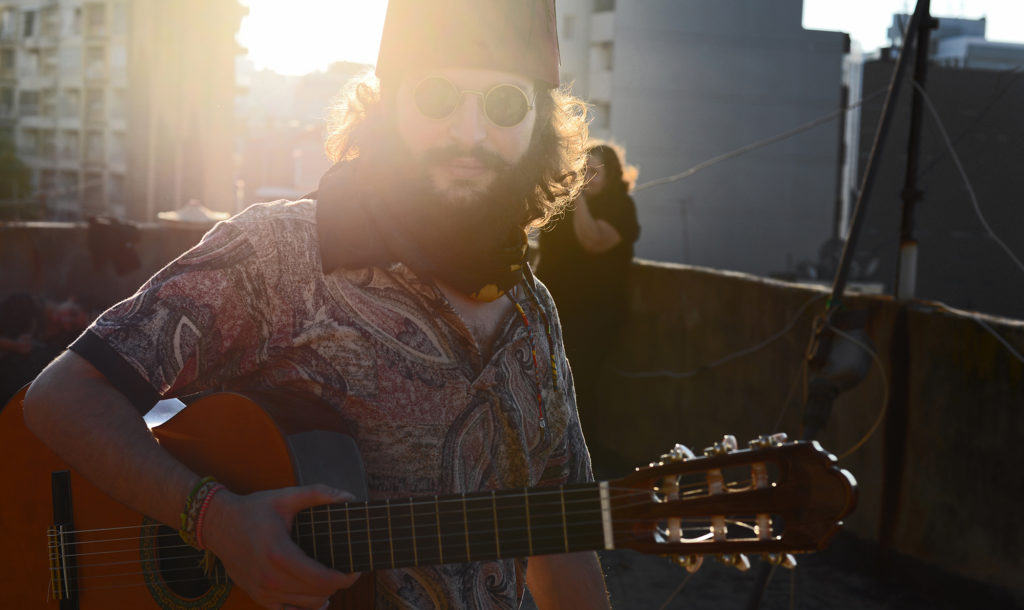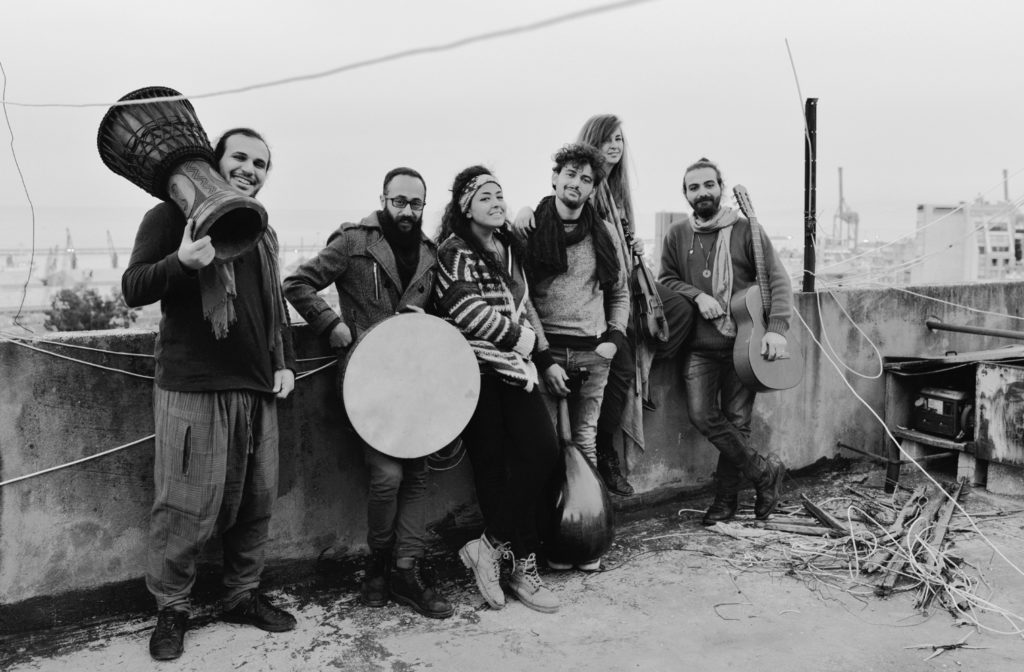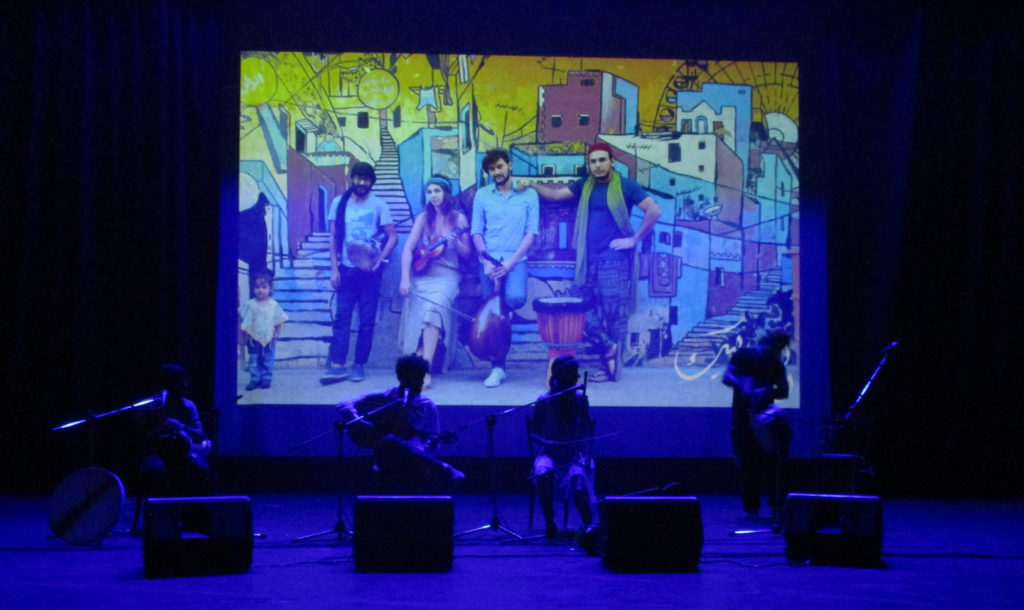Listen to the podcast below or on iTunes, Stitcher, SoundCloud and other podcasting apps.
When Syrian musician Ahmad Naffory’s mother opened the door to her home in Damascus, she found the Mukhabarat, Syria’s military intelligence service, standing outside.
After that visit in the winter of 2012, Ahmad didn’t have a choice about remaining in Damascus. “My mother, she called me and said, ‘Don’t come back home,” he recalled.
Fleeing
Ahmad thinks a song he wrote that was critical of President Bashar al-Assad brought about the visit from Mukhabarat.

It’s hard to imagine now, but many observers in the West thought Assad was a reformer. The Syrian economy was growing and it looked like democracy might even be on the horizon. This was before Syrian security forces opened fire on protesters in 2011, and Syria descended into war.
Ahmad was suspicious of Assad from the beginning. He wrote a song called “Hazoulat,” or “Damn it,” mixing traditional music from North Africa, then transitioning into the beat of a protest song. “Hazoulat” criticized the Assad government for failing to offer livelihoods to his generation, and extend the rule of law to all.
But the day Ahmad’s music caught up with him, he didn’t take any chances. He packed a bag, said goodbye to his family in Damascus, and headed for the border with Lebanon. He had his guitar with him, and hoped that the border guards didn’t already have his name on a list, or that the driver wasn’t an informant who would sell him out.
Assa’aleek is born

When the young musician arrived in Beirut, he said he found a very different place than what he left behind in Damascus. Beirut is known as the party capital of the Middle East, and downtown Beirut is full of ostentatious displays of wealth. Damascus is a more stoic and historic city. The down-to-earth bard felt out of place.
“It’s weird you know?” Ahmad said. “You wake up [and ask], ‘Where am I? And what should I do?’”
He found fellow musicians, including other Syrian refugees, and put together a band, which was originally called “Ahmad Naffory and The Band.” Soon, they wanted a different name and settled on Assa’aleek.
Assa’aleek is a plural word that means “bandits.” But it also refers to a pre-Islamic movement of iconoclastic poets. They celebrated individualism in a society where conformist, communal living was a strictly enforced social norm. Assa’aleek would write sarcastic poems making fun of tribal elders, then force those elders to pay them to never recite the poems. They would even rob caravans and distribute the riches to the poor.
“It’s like Robin Hood, but in [an] Arabic way,” Ahmad explained.
Assa’aleek’s music is undoubtedly Syrian, combining medieval lyrical chants, folk tunes from the 19th century, re-imagined religious chants, covers of theme songs from Japanese cartoons, and socialist-tinged music from the Pan-Arab era.

The music made Ahmad feel more at home in Beirut and provided an outlet for many of the daily indignities he endured as a refugee, from insults on the street to bureaucratic red tape. Ahmad took all of this and spit it back out as music, like in the song “Souri Aseel,” which means authentic Syrian. But still, he felt trapped. He talks about his time there as if it were blurry. A Syrian refugee in Lebanon can’t really plan for the future — his precarious status as a refugee precluded planning months in advance. Ahmad lived from day to day.
But despite the vagaries of his position, life moved on. At one show, Ahmad met Claudia Willmitzer, a German photographer. They started seeing each other and soon had moved in together. The band was playing shows at least weekly, and had become well-known enough that Ahmad was invited to festivals in Tunisia and the Netherlands. Life was getting more stable. Unfortunately, it wouldn’t stay that way.

On his way to Tunisia, the Lebanese state gave him a bittersweet going-away present: stamping his passport with a notice that he was banned from re-entering Lebanon. But instead of feeling despondent, he felt liberated.
“I felt so amazing … and I [flew] from Lebanon … I felt like now everything it will be fine,” he said.
Traveling to the Netherlands, he claimed asylum, married Claudia and was soon making a living from his music.
But back in Lebanon, the band felt unmoored. Everyone contributes to Assa’aleek, but Ahmad was its founder and leader. The band stopped playing for months, figuring out what to do without him.
A song for Belal
When I first met Assa’aleek, they were just starting their comeback. Over the course of a year, I watched as they started making music again.
The other band members, Sam Abduallah, Mohamad Khayata, Abodi Jatal and Inger Hannisdal, seem to focus on folk music now, rather than on writing new political songs. Their new focus appears to have gotten them a bigger following on Facebook. Maybe it’s because listeners want a respite from politics, or the band wants a respite from their own anxieties after Ahmad got deported. Or maybe it’s because both listeners and the band want to remember simpler times.

For a concert, instead of going to the Beirut bar where the band would be playing, I went to Amsterdam. I was going to watch the concert with Ahmad over a livestream. Ahmad wore a jean vest and baggy yogi pants. We had only just met, and he was pretty reserved, until the concert started. His music, played on the other side of Europe—even farther actually—opened him up. He talked about home, Lebanon, his travels to Europe, falling in love, the future of Syria, and optimism.
When the band in Beirut started playing one of the songs that Ahmad wrote about a a street kid named Belal, Ahmad told me about him. Belal, another refugee, sold roses near the bar where Ahmad and his band would play. Belal got to know Ahmad and Khayata, and one day the two musicians found him smoking. So Ahmad wrote a song, teasing him so that he would stop.
When Belal stopped smoking, Ahmad changed the lyrics, to celebrate Belal and to talk about all the children who have lost their lives to war. In Ahmad’s music, he gets to imagine a better future for them — a happier ending.
“All of [my songs] have [a] nice end, but [in this one] it’s like kind of hope,” he told me as we listened to the concert. “What we hope, what we wish. It’s not what is the reality, you know?”
Jahd Khalil is the 2016 GroundTruth Middle East reporting fellow, supported by The Correspondents Fund. The fellowship is offered in the spirit of the late journalist James Foley, who was murdered by the self-described Islamic State in Syria in 2014.
Editor’s note: The text has been updated to clarify that only Ahmad was invited to Tunisia, not the whole band, and to add Claudia’s last name.
“Hazoulat” by Assa’aleek
“Souri Aseel” by Assa’aleek
“Zaman el Nakhwe” by Assa’aleek
“Ya Shamsi Yalil Hala” (originally by Shikh Imam, performed by Ahmad Naffory)
“Belal” by Assa’aleek
Hear more of Assa’aleek and Ahmad Naffory’s music
- Assa’aleek SoundCloud and YouTube.
- Ahmad Naffory SoundCloud and YouTube
Reporter: Jahd Khalil
Editor & Producer: Samantha Fields
Sound Designer: Robert Andersson
Executive Producer, GroundTruth podcast: Charles Sennott
Managing Editor, GroundTruth podcast: Rachel Rohr




































